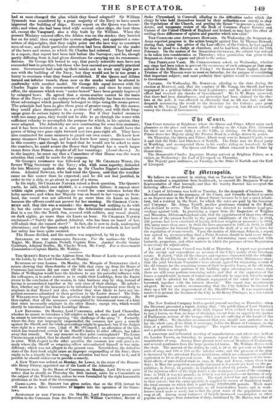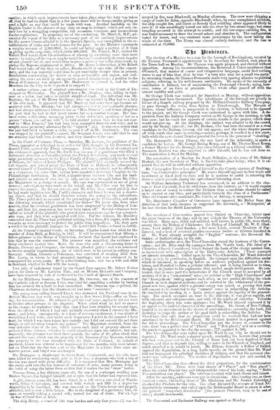'be IfIztropolis.
We believe we are correct in stating, that on Tuesday last Sir William Moles- worth received a requisition from Southwark, to succeed Mr. Benjamin Wood as Representative of that borough; and that the worthy Baronet has accepted the flattering offer.—West Briton.
A Court of Aldermen was held on Tuesday, for the despatch of business. Mr. Marshall attended on the summons of the Court, and formally declined to serve as an Inquest-marl in the Ward of Broad Street; because he is not a rated inhabi- tant, but a resident in the Bank, for which the rates are paid by the Governor and Company. Mr. Jftes Tyrrell, another gentleman resident in the Bank, also declined to serve. The City Solicitor was directed to institute legal pro- eeedings against both. In presenting a report from the Inspectors of Weights and Measures, Alders-was Copeland said, that the appointment of those two officers had been of the utmost benefit to the poorer inhabitants of the City: in 1843, 241 persons had been convicted of having deficient weights or measures; in 1844, 406, many more than once: in 1843 the fines amounted to 1431.; in 1844, to 226L The Committee for General Purposes reported the draft of a set of by-laws for the regulation of steam-vessels. Upon the motion of Alderman Johnson, a report was agreed to, recommending that a Petty Sessions should be held every Satur- day at the Guildhall, for the purpose of determining cases connected with bastardy, pauperism, and other matters in which the presence of two Magistrates is necessary for adjudication.
A Court of Common Council was held on Thursday. A report was presented of the receipt and expenditure on account of the City's moiety of the Gresham estate. It stated, "that all the charges and expenses connected with the rebuild- ing of the Royal Exchange will be satisfied and reported before 'Midsummer next; that the joint Gresham Committee have already agreed for reinstating several of the old tenants for the remaining terms of their respective leases, at the old rents, and for letting other portions of the building upon advantageous terms; that there are still some portions remaining unlet ; and that at the expiration of the leases a considerable increase of rental can confidently be expected, whereby ample means will be afforded for the ultimate repayment of the whole of the monies borrowed, together with the interest thereon." The report was unanimously adopted. So was another, recommending that the City Solicitor be directed to draw up a bill for the improvement of the Sheriff-Courts. It was unanimously resolved to present the freedom of the City to Sir Henry Pottinger, in a box valued at 100 guineas.
The New Zealand Company held a special general meeting on Thursday; when the Directors presented a report, stating that, "the publication of Lord Stanley's despatch to Governor Fitzroy, of the 13th August 1844, (which will now he read to you,) leaves, we fear, no hope of obtaining, except from an appeal to the justice of Parliament, redress of the wrongs which you are suffering at the hands of the Colonial Office. We therefore reconunencl that you should now authorize us to lay the whole case, if we think it necessary, before the House of Commons, in the form of a petition from the Company." fhc report was unanimously affirmed, and a petition was adopted. candles; in which such improvements have taken place.since the duty was taken 4 that helad no doubt that in a few years there will bocheap cales giving as
a light as any that could be made with wax- Another hardship on the
fish trader is the absence of any duty on soap in Ireland; which not only en- tails loss by a snuggling competition, but occasions vexatious and inconvenient Excise regulations. In proposing one of the resolutions, Mr. Mitchell, M.P., ad- vocated the repeal of the duty as a necessary part of the sanitary improvements for the poorer classes alluded to in the Queen's Speech, mad exemplified in the es- tablishment of baths and wash-houses for the poor. As the Minister commands a surplus revenue of 3,300,0001., he could not better apply a portion of it than in giving up the soap-duty, which yields 800,0001. Mr. Forster, M.P., wished Sir Robert eel would show his abhorrence of slavery by something more than mere words: by taking off the tax on soap he would increase considerably the trade in palm oil and ground nut oil, and would thus impose a salutary bar tothc slave-trade, by giTing the Negroes employment in Africa. Mr. Hume Is-Roved that, if Sir Robert Peel would take off the duty on tallow, Russia would at once take off the export- duty, and the raw material could thus be got materially cheaper than at present. Resolutions condemning the duties on soap us impolitic and unjust, and indi- cating the views set forth by he speakers, passed unaniumuely ; a petition to the House of Commons was adopted ; Mr. Masterman to :.resent it, and the other Members for the City to be requested to support it.
A rather curious case of criminal conversation was tried in the Court of Ex- chequer on Weatesday. The plaintiff was a Mr. Absolun; who, failing in busi- ness as a tailor, had taken to exhibit sleight-ofehand. The defendant was Mr. Banbury, the son of Sir He Bturbury; who was married in May last to a lady of his own rank. It appeared that Mr. Banbury had some time ago become ac-
quainted with Mrs. Absolon; bat had always seen her in her husband's absence,
and had always addressed letters to her as "Miss Francis"; and it-was alleged on his part that be had in fact never known her as a married woman. Her hus-
band wrote a ridiculous menacing totter to the defendant, speaking of her as a Jerson "whom you call my wife"; be told another person that he was not smar- med to "Miss francis," hilt had lone been separated from his real wife; and he sought some pecuniary allowance for the " injured " girl. It was even stated that the pair had tried to borrow a child, to pass it off as Mr. Itunksry's. The case was stopped by the plaintiff's counsel, Mr. Sergeant Jones; who said that he and the attorney had both been deceived, and they abandoned the case.
In-the -Court of Common Pleas, on Saturday, Mr. Lawson, the publisher of the Timed, appeared as defendant in an action for libel, brought by the Reverend Na- thaniel Forth against the Times newspaper. From the statement of counsel and the evidence it appeared, that Mr. Forth was the son of a gentleman who filled a diplomatic situation at Versailles before the French Revolution, and made several large pecuniary_advanees to the Royal Family of France, particularly to the Duke of leans the father of Louis Philippe. The plaintiff had originally entered the Life Guards, and served under the Duke of York in Holland; lie subsequently entered himself of Pembroke College, Oxford, and was ordained ; and he officiated as a clergyman for seine time, having been appointed Assistant Chaplain to the Philanthropic. Institution. In 1843, a dispute arose between him and his land- lord relative to arrears of rent due by him, and lie was brought before Mr. Clive the Magistrate on a charge of assault. His case was represented as one of great distress; subscriptions were made on his behalf, and Mr. Clive sent for him to receive the money. He did not attend; and Mr. Clive then stated publicly that be had made inquiries into Mr. Forth's character and found he was not a deserv- ing object, and that he should therefore return the money to the subscribers. The Times published an account of the proceedings at the Police-office, and made the following remark, which constituted the libel—" We know also, from other Sources, that the reverend gentleman has been suspended by the Bishop of Lon- don; and that his suspension has never been taken off." Several witnesses were 'called on behalf of the plaintiff; who proved that some years ago he was a respect- able man, and they were acquainted with him. For the defence, Mr. Huinfrey contended that the Times had published nothing but a bona fide report, with such remarks as were necessary to protect the public from imposition. he Jury gave a verdict for the plaintiff, damages Is. The Lord Chief Justice refused to certify. At the Central Criminal Court, on Saturday, Charles Lamb was tried for the murder of John Brill, at Ruislip, in 1837. It will be remembered that Sibson, a fellow-prisoner in the House of Correction, declared that Lamb had confessed to him that he was the murderer. The prisoner was acquitted, the evidence not being conclusive against hiin. Kent, the man who sent a threatening letter to Messrs. Prescott and Company, the bankers, pleaded guilty: and was sentenced to twelve montidimprieonment, six of which were to be passed in solitary con- fidement. Gillias. formerly a Policeman, was convicted of stealing 1651. from Mes. Lewis, to whom he had promised marriage; and was sentenced to be transported for seven years. He is a fine-looking man, and has a wife and child Scotland, whither he fled with the money.
Two bills of indictment found by the-Grand Jury against Mr. Robert Forbes junior, for libels on Mr. Lachlan Rate, and on Messrs. Rickards and Company, have been removed by writ of certiorari to the Court of Queen's Bench.
At the Middlesex Sessions, on Thursday, Mr. Donovan, one of the masters of the Catholic school at Somers Town, was tried for assaulting a scholar by beating him too severely for a fault he had committed. Mr. Donovan was acquitted, the Chairman declaring that the chastisement had been " moderate."
The young man calling himself Lloyd, who destroyed the Portland vase in the British Museum last week, was brought up to Bow Street Police-office on Tues- day, for reexamination. He refused to give his real name, saying he did not wish to involve other persons in his disgrace. When asked what he had to answer to the charge, he replied—" Only this, that I had been drinking for several days, from the effects of which I leaf only partially recovered when I entered the Mu- seum; and king, consequently, in a state of nervous excitement, I was afraid of everything I met with; and under such impression I acted in the manner I have done, for which I was then taken into custody: but I did not commit the act from design or evil intention towards any person." The Magistrate doubted, from the very defective state of the law, which leaves such kind of property almost un- protected from violence, whether he could adjudicate upon the subject: but sub- sequently, the prisoner was fined three pounds, the value of the glass shade that covered the vase, which was the property of the Trustees of the Museum, whereas the property in the vase remained with the Duke of Portland. In default of payment, Lloyd was ordered to be imprisoned for two months, with hard labour; but on Thursday the fine was sent to the Magistrate in a letter from some un- known person. and Lloyd was discharged. stroyed by fire, near Blackwell, on Monday afternoon. The crew were chipping cargo of coals for Aden, opposite Blackwell; when, by some unexplained accidents the ship caught fire, and burnt so fiercely that scuttling alone appeared likely to save it: it was accordingly towed out into the river by two steam-tugs; but some bungling occurred in the attempt to scuttle, and the tow-ropes catching fire, it was found necessary to draw the vessel ashore and abandon it. The conflagration lasted for hours, and was rendered more picturesque by the snow falling the whole of the time. The Henry was almost entirely destroyed, and the loss is estimated at 10,0001.



























 Previous page
Previous page